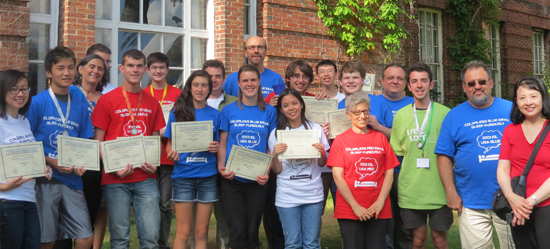Dragomir Radev Coaches High School Linguists in Competition at International Linguistics Olympiad

 Enlarge
Enlarge
Dragomir Radev, Professor in Computer Science and Engineering, the School of Information, and in the Department of Linguistics, has coached US high school students to successful competition at the 11th International Linguistics Olympiad (IOL), which was held in Manchester, UK, from July 22 through 26th, 2013. It is the seventh year that Radev has coached the team.
Two four-student teams from the US and one from Canada made the trip to compete in the IOL from North America. Prof. Radev and Prof. Lori Levin of Carnegie Mellon University coached the US teams; Pat Littell, a doctoral student at the University of British Columbia, coached the Canadian team. The US and Canadian teams held joint practices via videoconference prior to the olympiad and arrived in England two days in advance for extensive training and team building exercises in person.
The IOL, one of twelve international science olympiads, consists of two events. The first is the individual contest, a six-hour test, which this year had problems about the languages Yidini, Tundra Yukaghir, Pirahã, and Muna, as well as a problem on functional magnetic resonance imaging (fMRI). The second event is the team contest, which this year involved an ancient variant of Georgian, the language of the Republic of Georgia in the Caucasus region of Eurasia. To solve these problems, contestants must apply knowledge about the way languages work as well as logic and reasoning skills to decipher unfamiliar languages and writing systems.
One of the two USA Teams (USA Red) won both team competitions. In the team problem competition, the US team was followed by Russia, Bulgaria, and Romania.
In the individual contest, the absolute winner among all 137 contestants, with 87 points out of 100, was Alex Wade (USA Red), who received one of seven gold medals; the other six gold medals went to contestants from Russia, the Czech Republic, Brazil, Poland, Bulgaria, and Latvia. Jeffrey Ling and Aaron Klein won silver medals for the US teams. Max Schindler and Tom McCoy won bronze for the USA and Daniel Lovsted won a bronze for Canada.
The IOL mimics the skills used by researchers and scholars in the field of computational linguistics, which is increasingly important for the United States and other countries. Using computational linguistics, experts can develop automated language technologies such as search engines and translation software that cut down on the time and training needed to work with other languages.
35 teams from 26 countries competed in the 2013 IOL, the most teams ever. US and Canadian team members were selected from more than 1,700 students who competed in the North American Computational Linguistics Olympiad (NACLO). Profs. Radev and Levin are founders of NACLO.
More info:
NACLO press release (PDF): USA and Canada Triumph at the International Linguistics Olympiad
Wikipedia: International Linguistics Olympiad
Wikipedia: North American Computational Linguistics Olympiad


 MENU
MENU